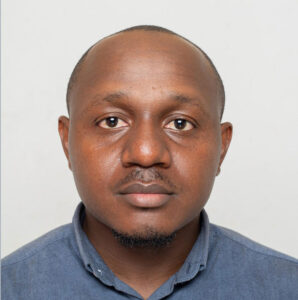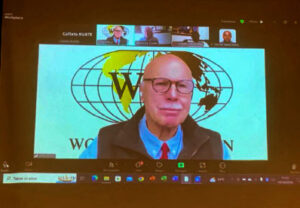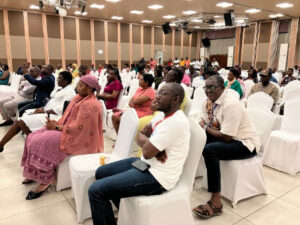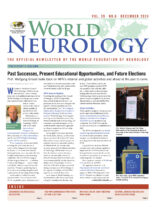The Hybrid Presidential Symposium of the Fourth Congress of the Cameroon Academy of Neurology.
By Daniel Gams Massi

Daniel Gams Massi
During its fourth congress from Oct. 18-20, 2024, in Douala, the Cameroon Academy of Neurology (CAN) organized its second hybrid Presidential Symposium. This session was enhanced by the participation of Profs. Wolfgang Grisold, president of the World Federation of Neurology (WFN), Prof. Lawrence Tucker, president of the African Academy of Neurology (AFAN), Prof. Amadou Gallo Diop, immediate past-director of the WFN Training Center of Dakar, Senegal, and Prof. Riadh Gouider, past trustee of the WFN and head of the neurology department of Razi University Hospital in Tunis. The symposium was chaired by Dr. Daniel Gams Massi, CAN secretary-general and AFAN treasurer.
Prof. Grisold opened the symposium with a presentation on the implementation of the Intersectoral Global Action Plan for Epilepsy and Other Neurological Disorders (IGAP). He outlined the concept of brain health and its five dimensions: advocacy, research, therapy, public health, and prevention. He also presented the vision, goals, and strategic objectives of IGAP:
- Raise policy prioritization and strengthen governance
- Provide effective, timely, and responsive diagnosis, treatment, and care
- Implement strategies for promotion and prevention
- Foster research and innovation and strengthen information systems
- Strengthen the public health approach to epilepsy

Prof. Wolfgang Grisold gave an online talk on implementation of IGAP in Africa.
The audience was able to see the essential role the WFN plays in the implementation and promotion of IGAP worldwide, as well as the many opportunities the WFN offers for the development of neurology in Africa through training, research, and advocacy. This is an opportunity to recall that for several years the WFN has contributed to the training of Cameroonian neurologists through various programs. And through Education in Headache to Health Care Providers in Africa, the WFN also contributes to the continuing education of health care professionals in Cameroon.
Prof. Diop illustrated the idea of the African neurologist of tomorrow. He said that to carry out his missions, the African neurologist must be a good clinician, an ambitious researcher, a dedicated trainer, a skilled communicator, a community actor close to the population, and a citizen of the world capable of collaborating with African and foreign partners.
The WFN Training Center of Dakar has trained and continues to train several Cameroonian neurologists. Prof. Gouider spoke about the challenges in the African integration of this neurology training, including how Africa’s rich ethnic, cultural, and linguistic diversities may contribute to constraints on this integration. Other contributing factors include a lack of human resources due to significant disparities in the numbers of doctors and neurologists, insufficient specialized center structures, and a lack of diagnostic resources and treatment.
Despite these issues, there is hope because the number of neurologists trained in the continent has increased with the contribution of the WFN Training Centers in Senegal, South Africa, Egypt, Morocco, Tunisia, and several more recent Training Centers in Sub-Saharan Africa. However, the number of trained neurologists remains largely insufficient, especially in the context of brain drain as more qualified individuals leave the area.

The audience during the hybrid Presidential Symposium.
Although Africa has historically been one of the cradles of neurology research going back to ancient Egypt, it contributes little to modern global research. These challenges can be addressed by reinforcing intra-African and international collaborations.
The symposium was closed by Prof. Tucker who discussed the integration of online training in EEG for residents and young neurologists. He shared the experience of the University of Cape Town’s online EEG course. It is a hybrid program with web-based courses, virtual seminars, and in-person clinical neurophysiology fellowships for recently qualified neurologists. Since 2018, numerous neurologists, neurology residents, and neurotechnologists from Africa and other continents have benefited from quality EEG training.
The symposium hosted 224 attendees, including neurologists, pediatric neurologists, neurosurgeons, pediatricians, psychiatrists, internists, residents of neurology, psychiatry, pediatrics, and general practitioners, nurses, and physiotherapists from 16 countries.
On behalf of the CAN, we would like to express our gratitude to the WFN and AFAN for the unconditional support of the activities of our young society throughout the years. These activities have contributed to educating community and health care professionals on neurological disease, and to the opportunity to train more neurologists through the opening of the University of Douala neurology Training Center in 2023.
Even if there is more work to be done, we know that by continuing these activities and working with our partners, we will be able to significantly improve access to quality neurological care for populations in Cameroon and Central Africa. •
Daniel Gams Massi, MD, is secretary-general of the Cameroon Academy of Neurology.
